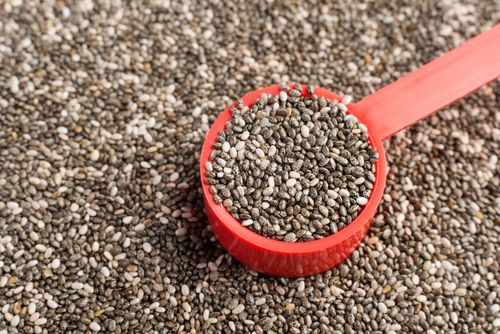Chia Seeds Can Get Stuck In Your Throat, But That Doesn't Mean They Can't Be Consumed Safely

Somewhere along the way, chia seeds graduated from growing a chia pet to coveted superfood. That’s not to throw shade: A mere 2-tablespoon serving costs a person 117 calories and packs 4 grams of protein, a little over 8 grams of fiber, and five times the amount of heart-healthy omega-3s that’s found in a quarter cup serving of walnuts. These numbers only get more impressive when you look to their high levels of iron, magnesium, calcium, and potassium. So why are these seeds suddenly being touted as dangerous? Turns out, when consumed dry, they can impact your esophagus.
Dr. Rebecca Rawl, of the Carolinas Medical Center in Charlotte, N.C., presented this research at the American College of Gastroenterology Annual Scientific Meeting while a 39-year-old-man actually experienced it. Granted, this man had a history of dysphagia (difficulty swallowing), but he found himself in the emergency room after chasing a dry tablespoon of chia seeds with water. Since they can absorb up to 27 times their weight in water, the seeds can expand mid-swallow and lodge themselves in the esophagus, especially if there’s already a history of swallowing problems.
In this particular man's case, the chia seeds became so impacted that Rawl had to use an endoscope normally used on babies in order to reduce the size of the seed for it to push through, she told Time. And so Rawl’s research warns patients against consuming dry chia seeds. However, she added this is the first case she's ever come across, and it’s not to ruin chia seeds for everyone else. The seeds can, in fact, be consumed safely.
“[Chia seeds] should only be mixed with sufficient amounts of liquid to allow them to expand before consumption,” Rawl said. “Patients with any history of swallowing problems should use them with caution. Patients should present for medical evaluation if they have difficulty swallowing foods or liquids, especially if they are unable to swallow their own saliva as this can be a sign of complete blockage of the esophagus.”
When chia seeds mix with water, or almond milk, or yogurt, they absorb the liquid and puff out, taking on a gel-like consistency. Not to mention they become palatable, unless you're into really crunchy seeds. In addition to the aforementioned nutrients, chia seeds can stabilize blood sugar levels and regulate the diabetic effect in people with type 2 diabetes. All that calcium builds strong bones, and the fiber means adding them to any meal will leave you feeling fuller longer.
Published by Medicaldaily.com



























